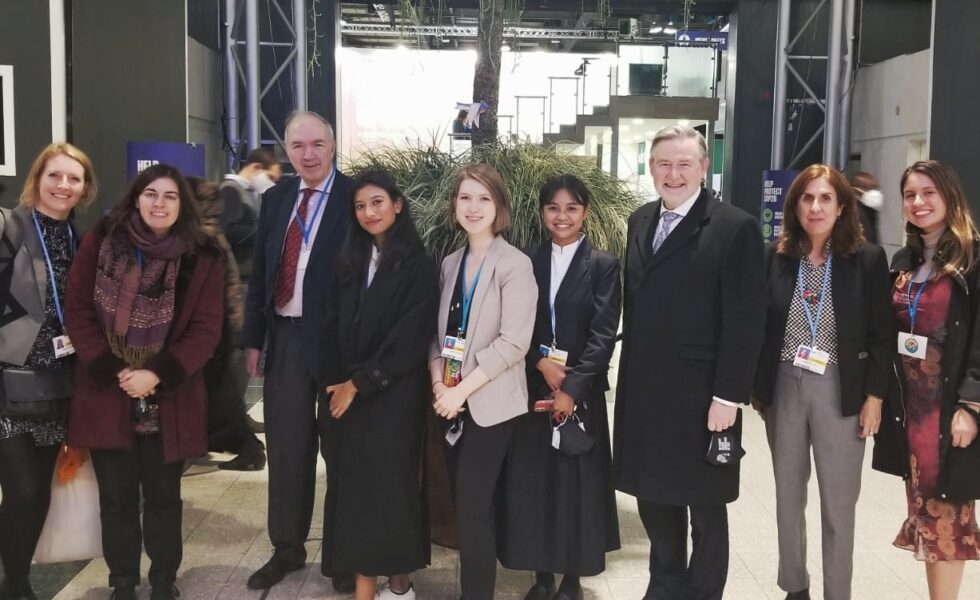
Brighter Green’s Participation in the COP26 Climate Summit in Glasgow

Brighter Green participated in COP26 this year, and Executive Director Mia MacDonald traveled to Glasgow in early November to attend the events. We were part of a number of coalitions and pushed world leaders to acknowledge and address the significant impact of animal agriculture and food systems on climate change, and the many ways in which rising global temperatures are affecting agriculture in urgent and devastating ways. Brighter Green collaborated with Feedback, ProVeg International, and other partners to host an official COP26 side event, No More Omissions: Addressing the Ambition and Scale of Change Required in Global Food Systems, on November 9th. You can watch the full event (about 90 minutes long) on YouTube here.
Read more below, and find more details, documents, and links to our work at COP26 here.
Official Side Event
In the side event, which was moderated by Mia MacDonald, we discussed the ways policy experts should address food systems issues, specifically the impact of livestock production on the climate, and how we can best make recommendations for decreasing emissions of greenhouse gases (GHGs) and meeting the goals set by the Paris Agreement. The science surrounding climate change is clear. We need to take urgent action to ensure the planet is inhabitable for future generations. But policymakers are not heeding the recommendations the science has given. The panelists discussed the bold policies and programs already in place to create alternatives to our current unjust and unsustainable system of meat production and consumption, and how they should be scaled to address the problem at a global level.
You can read more about the side event on the COP26 page on our website.
Supporting the Work of Climate Activist, Vanessa Nakate
Brighter Green is a supporter of Ugandan climate activist Vanessa Nakate’s work and vision, and we also worked on her book, a memoir and manifesto, which has just been published, “A Bigger Picture: My Fight to Bring a New African Voice to the Climate Crisis. We were pleased to see Vanessa accorded a number of platforms at this year’s COP26 and appreciate her dedicated activism on climate justice with other Fridays For Future leaders, in both the conference meeting rooms and the streets of Glasgow. She spoke several times at conference plenaries (one example), was featured on the cover of TIME, was quoted in The New York Times, and was on The Daily Show with Trevor Noah, among other notable achievements. We urge everyone to pick up a copy of her book, which amplifies her message that people from the global South are often not at the table when solutions to climate change are being discussed. The book tackles the issue head-on and features Vanessa’s personal story and that of many other young climate activists across Africa and on other continents.
Published Works
Mia MacDonald and Feedback executive director Carina Millstone co-authored an article during the conference, “Why Serving Meat at a Climate Conference Is a Problem,” focusing on the hypocrisy of serving meat at the world’s largest climate conference. A salient quote from the piece is as follows:
“Methane (CH4) is at least eighty times more intensive a greenhouse gas than CO2. Because CH4 lasts less long in the atmosphere, tackling it now would not only offer a greater short-term impact by flattening the rising temperature curve slightly, but would potentially buy human civilization a few more years to set in place systems to drastically reduce CO2 emissions.”
Judy Bankman, Brighter Green project manager, also wrote an article tied to the “methane pledge” announced at COP26, “In the Global Methane Pledge, Agriculture Should Be Front and Center.” The piece calls attention to the fact that 40 percent of methane emissions stem from the agriculture sector, with 32 percent coming directly from livestock production and challenges leaders to consider why livestock production is routinely left out of dialogues about climate change and methane abatement, and to change this trajectory.
Sign On Letters, Petitions, and Submissions
Brighter Green also joined several sign-on letters and statements for COP26 by colleague organizations urging a reduction in the GHGs created by animal agriculture and feed production; an immediate, substantial reduction in the number of intensive animal agriculture operations; and policies to accelerate and support plant-forward food systems. Among the groups we partnered with on these efforts are Humane Society International, Compassion in World Farming, and the Youth Sustainable Diets Campaign Committee (read the letter here). the and Compassion in World Farming. We joined Compassion in World Farming in urging government leaders to create food systems change that . We also worked with ProVeg International, 50by40, and other partners to write a submission to the Koronivia Joint Work on Agriculture, the only formal UNFCCC process working on agriculture.
Read more on COP26 here.
 Brighter Green
Brighter Green



